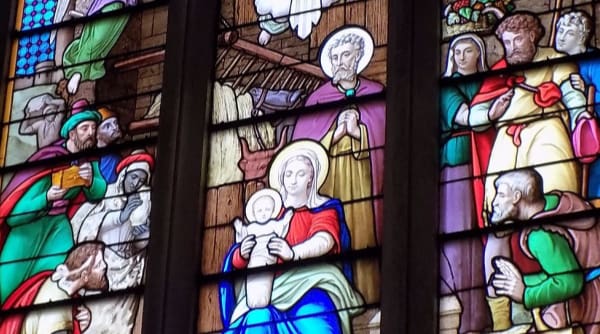As the Divine Praises remind us, St. Joseph is Mary’s most chaste spouse. He is a master of purity and a master of modesty, even if he needs a little convincing on this point. A master of purity is able to see, to read, in the language of the body, the mystery of God’s presence hidden in the intimate center of another. A master of modesty does not exploit this mystery, nor expose this mystery, nor run away from this mystery, but rather veils the mystery with his love. In the end, St. Joseph both sees and veils the mystery of God’s spousal love for mankind expressed in the body of the Blessed Virgin Mary. But it took an angel to help him understand this and have the courage to accept the task.
Purity and modesty
We turn to the Catechism to understand more clearly the two virtues of purity of heart and modesty. The Catechism teaches us: “[purity of heart] enables us to see according to God…; it lets us perceive the human body–ours and our neighbor’s–as a temple of the Holy Spirit, a manifestation of divine beauty” (CCC, 2519). Purity of heart allows us to behold the mystery, the beauty hidden in the heart of another, but seen through the body. In regard to modesty, the Catechism of the Catholic Church paragraph 2521 reads, “Modesty protects the intimate center of the person. It means refusing to unveil what should remain hidden…”and in paragraph 2522 we read, “Modesty protects the mystery of persons and their love… it keeps silence or reserve where there is evident risk of unhealthy curiosity. It is discreet.”
St Joseph’s drama – purity sees the mystery, humility backs away
Let us turn now to the Scriptures to see how the drama of St. Joseph’s life unfolds. Throughout the ages, the “Masters of Suspicion,” as St. John Paul II names them, read the Annunciation to St. Joseph with the suspicion that no one, even St. Joseph, could have sufficient purity of heart to see the mystery of God’s love in the unexpected pregnancy of the Blessed Virgin Mary. This presumption colors the interpretations of key biblical passages, supposing that St. Joseph saw Mary as an adulteress. Modern Scripture scholarship and the Doctors of the Church help us to reread these passages in the light of truth. The passage in question comes from St. Matthew’s Gospel and we hear it each year in the Mass on Christmas Eve and on the Solemnity of St. Joseph: “Joseph, her husband, since he was a righteous man, yet unwilling to expose her to shame, decided to divorce her quietly.” (Mt 1:19)
First, we need help with two Greek words–the verb deigmatizo, translated here as “expose to shame” and apoluo translated here as “divorce.” While we cannot go into all the details, a valid re-translation of this passage is proposed by the Jesuit scripture scholar Fr. Ignace de la Potterie, “But Joseph, her spouse, who was a just man, and who did not wish to unveil (her mystery), resolved to secretly separate (himself) from her.” (Mary in the Mystery of the Covenant, p. 39)
From this we get a better understanding of the insight of St. Bernard of Clairvaux who wrote, “Why did he wish to leave her?… He saw, with sacred astonishment, that she bore a special quality of the divine presence, and while not being able to understand this mystery, he wished to leave her.” (Hom. “Super Missus Est”) St. Thomas Aquinas reiterates this insight in his Summa Theologica, “Joseph wanted to give the Virgin her liberty, not because he suspected her of adultery, but out of respect for her sanctity he feared to live together with her.” (Supplementum III, q. 62, art. 3)
Then the angel appears to St. Joseph in a dream and helps him (and us) to understand the following truth expressed by St. John Paul II in his reflections on the Sermon on the Mount in the Theology of the Body, “[Christ] assigns the dignity of every woman as a task to every man.” And “he assigns also the dignity of every man to every woman” (TOB 100:6). Upholding this dignity “is assigned as ethos to every man, male and female: it is assigned to his ‘heart,’ to his conscience, to his looks, and to his behavior” (TOB 100:7). St. Joseph is assigned the “task” of Mary’s dignity. This task requires two virtues: purity, to see, and modesty, to protect.
Scripture scholarship and the Doctors of the Church reinforce our faith that St. Joseph’s purity of heart allowed him to behold a great mystery in the body of Mary. In the purity of his heart, St. Joseph beheld in his virginal bride not the sin of an adulteress but the awesome mystery of God’s presence. The body of Mary caused the sacred astonishment of St. Joseph as he beheld the great mystery of divine, spousal love in the language of Mary’s virginal pregnancy.
At the same time, St. Joseph recognized the virtue necessary to protect such a profound mystery. He feared that in his human weakness, he might defile the mystery by remaining close. Like St. Peter and the centurion who both said, “I am not worthy,” St. Joseph did not consider himself virtuous enough to veil this mystery by his presence; rather he thought he could do so better by his absence. Because of this, reasoned St Bernard, St Joseph decided to separate himself (apoluo) from Mary.
Obedience veils the mystery
Fortunately, in God’s gentle Providence, He sent an angel to St. Joseph to reassure him that he should protect her mystery by remaining her husband, by taking her mystery with him under his roof. Scripture affirms that St Joseph obeyed the angel. We can even read the exactitude of his obedience by the exact correspondence in scripture. The angel said, “Take Mary your wife into your home” (Mt 1:20) and Scripture affirms, “When Joseph awoke, he did as the angel of the Lord had commanded him and took his wife into his home.” (Mt 1:24)
One of the Church Fathers claimed the success of Joseph’s obedience in indicating that it is precisely the marriage that he maintained with Mary that protected her from the devil. Referring to something written by St Ignatius of Antioch, Origen asserted that the devil did not find Mary because he was looking for a Virgin rather than a married woman.
I found an elegant statement in the writing of a martyr–I mean Ignatius, the second bishop of Antioch after Peter. During a persecution, he fought against wild animals at Rome. He stated: “Mary’s virginity escaped notice of the ruler of this age.” It escaped his notice because of Joseph, and because of their wedding, and because Mary was thought to have a husband. If she had not been betrothed or had (as people thought) a husband, her virginity could never have been concealed from the “ruler of this age”. (Trans. By Joseph Lienhard, Origen: Homilies on Luke, Fragments on Luke, FC 94 [Washington, 1996, 24-25], quoted in St. Joseph in Early Christianity, pp. 36-37)
St Joseph’s obedience to the angel’s command served as a veil to protect Mary and her Child from the ruler of this age. This pattern was repeated twice more as St Joseph protected the Child and His Mother from Herod’s wrath (Mt 2:13) and the menace of Archelaus (Mt. 2:22) through his humble obedience to the angel’s command (Mt 2:14,22).
Let us ask St. Joseph to teach us true chastity in purity of heart, in modesty and in obedience. We ask him first to teach us to have sensitive hearts that can recognize the beauty of the mystery of God’s presence in us and in others. Then may he teach to protect that mystery through the obedience of faith. In this way, like St. Joseph, we will enter into deeper communion with Mary and the Mystery of God’s love revealed in the Word made flesh in her womb.
Originally published on FatherBoniface.org and used with permission.
Image courtesy of Pixabay.




